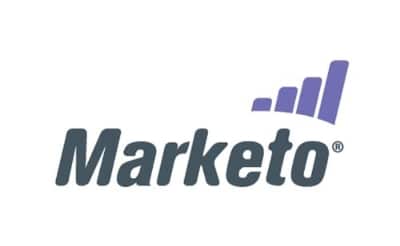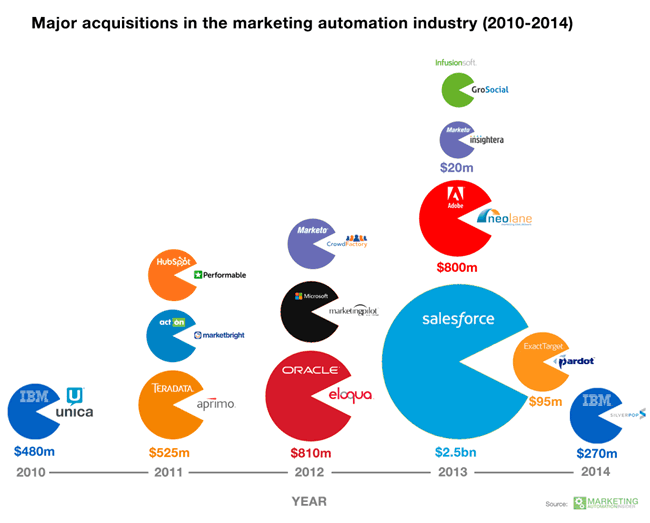 For years the question hasn’t been if but when and by whom Marketo would be acquired after so many of its marketing automation competitors became part of one of the bigger marketing technology stack vendors.
For years the question hasn’t been if but when and by whom Marketo would be acquired after so many of its marketing automation competitors became part of one of the bigger marketing technology stack vendors.
Today that question is answered: Marketo gets acquired by Vista Equity Partners for $1.79 Billion.
In an all-cash deal Vista will acquire all outstanding shares of Marketo common stock whereby shareholders will receive $35.25 in cash per share, the announcement says.
Vista Equity Partners: strong in SaaS
Vista Equity Partners is a private equity firm with a portfolio of mainly SaaS-based software platforms in the space of technology, marketing, analytics and enterprise applications.

Marketo customers will probably best know Return Path, the leader in email deliverability, which rebranded itself as a Global Data Solutions Provider.
Among the other technology firms in Vista’s portfolio are cloud CRM provider Bullhorn and TIBCO Software, a leading provider of data analytics integration software. Earlier this year Vista already acquired several companies such as cloud-based enterprise event management company Cvent.
From public to private in less than 3 years
In 2013, when a myriad of marketing automation platforms already were acquired, Marketo went public.
Industry watchers for many years believed Marketo would be acquired by one of the remaining big software vendors such as SAP or Microsoft.
The rumours and speculations about who would buy Marketo have increased over the past few weeks and while SAP has been seen as a potential candidate for at least three years now, the name Microsoft started to be heard more often. All speculations are proven wrong and Marketo goes back from public to private with Vista.

What’s next for Marketo?
Although the deal is good news for shareholders, who benefit from Vista’s offer which comes at a 64% premium to the unaffected closing price as of May 9, and although Vista is a strong partner and the investors obviously promise further innovation (more on that below), Marketo misses out on customers who go for a strong marketing cloud vendor and prefer one vendor.
In a 2014 Forrester report on that marketing cloud landscape, Marketo fell into the contendors category, along with SAP. As CMSWire reported, Forrester had doubts about Marketo’s small-scale deployments. However, Marketo has been positioning itself differently with a focus on ‘customer engagement’ although in reality it was hard to tell where exactly the company stood.
Phil Hernandez, CEO Marketo: “The acquisition will allow Marketo to continue to focus on customer success and to remain the independent category leader, continuing to set the agenda for product innovation and thought leadership for the entire digital marketing industry. It will also enable us to successfully deliver on the bold vision we recently set forth – to give tomorrow’s marketers and the C-suite an ultra-high-scale enterprise platform for customer engagement”.
In larger organizations, Marketo is often chosen in a more centralized approach with a few super users who like its linear block structure. In more decentralized environments (e.g. international companies where marketing is spread across various countries and whereby non-specialist tasks need to be performed), companies ofen select marketing automation platforms with easier user interfaces. A few years ago there were rumours about a coming new and easier user interface but so far they haven’t come true.
In the annoucement of the acquisition Vista’s Brian Sheth calls Marketo the clear leader in the marketing automation space with over 4,600 customers. However, it’s a well-known fact that Marketo has more SMEs in its customer portfolio than, for instance Eloqua (acquired by Oracle in 2013 and with a focus on B2B). Where exactly will Marketo ‘play’? It’s wait and see and not too much speculation. The acquisition is certainly a case against the latter but let’s give it a go anyway.
Thoughts and facts
While some argue that the price is relatively low, it’s important to realize that Marketo has been acquired at approximately 5.5 times its annual revenue (with zero profit) and it needs to be seen how high revenue growth and most of all profitability can be in today’s market.
Moreover, as just mentioned, Marketo does have quite some SMEs, including smaller businesses in its portfolio, and its positioning isn’t really crystal clear to put it mildly: as far as we’re concerned Marketo is not for small enterprises. So what is the strategy of/with Vista? On top of the strategy question there is also the question WHY all speculations were wrong. Hard to tell but here are some facts and thoughts.
The Vista Equity Partners factor
First there is the factor Vista Equity Partners. Forbes points out how the company is making big investments in a market where investors retreat fast growing but money losing tech stocks. Forbes’ Antoine Gara also refers to Bloomberg data, indicating that the $1.4 billion acquisition of Cvent and the Marketo deal stand out as the largest US software take private deals.
Moreover, it doesn’t seem that Vista is about to stop its strategy. Having purchased Solera in September for $5.7 billion, it is rumored to have some more surprises up its sleeve. Traditional PE or something else? Is there a possibility that Vista aims to combine some of the solutions in its portfolio to offer a new, differently positioned, proposition? Everything is possible but let’s not forget that Vista remains a private equity (PE) firm and if it follows upon tradition the focus will be on optimizing profit (cutting costs being part of that) and not on innovating, competing with the big marketing cloud vendors or coming up with something new.
If its aim is to sell Marketo after operation EBITDA is over, the question becomes who will be a potential buyer. If its aim is to come up with a new kind of vendor/proposition, that means investing loads of money. Unlikely but the future will tell. Obviously a mixed approach is possible too: pump up profitability, combine it with ‘something’ else and try to sell.
The Microsoft, SAP and Marketo factor
Then there are Microsoft, SAP and of course Marketo itself. The rumors about an active search for a buyer intensified at the occasion of Marketo’s recent Marketing Nation Summit, with both Microsoft and SAP being mentioned.
Reuters confirms what everyone in the industry knew, that Marketo had been giving presentations to both companies for a potential sale.
Microsoft has a tradition of working with its ecosystem of partners and developers but it also has done quite a bit with Marketo integration itself. Why the company (or SAP) didn’t acquire Marketo is not clear. Valuation? Strategic choice? Or, not impossible at all, Marketo preferring to take the cash, make shareholders happy and avoid being trapped in an acquisition by vendors that don’t exactly have the best reputations when it boils down to acquisitions?
A while ago Marketo announced some small Spring updates and at its annual event it obviously came with more announcements but nothing impressive. Now what? No clue. That’s even more speculation. What’s for certain is that Marketo stays independent (so we can’t speak about a consolidation move here) and that it is acquired by a PE firm. That might just be it.

Marketo was founded in 2006 by Chairman and CEO Phil Fernandez and Jon Miller, who left and founded ‘Account Based Everything’ platform Engagio last year.
Miller raised $10M last year with Engagio from FirstMark Capital which has an impressive investment portfolio in the marketing and tech space.

